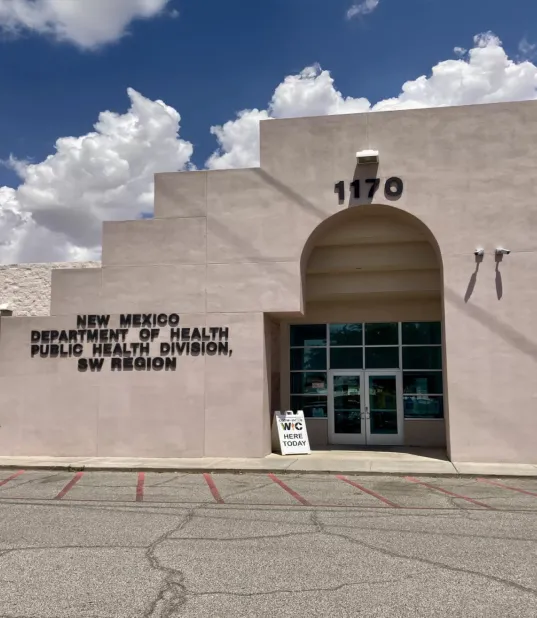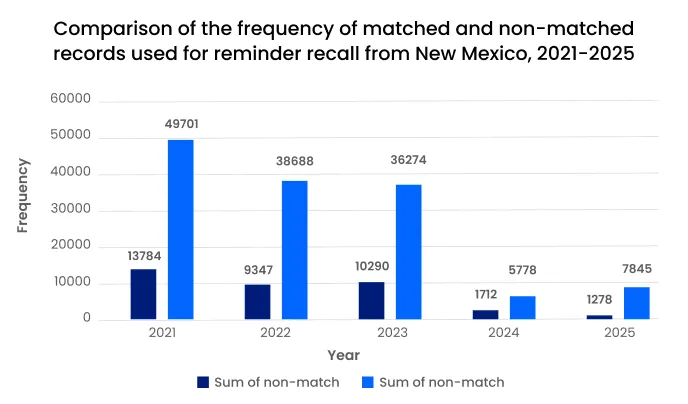New 42-day free trial Get it now

New Mexico Department of Health boosts vaccine outreach with cleaner address data
Products used
US Address Verification

At a glance
Challenge
25,000 users exchange and edit data simultaneously, overwriting updates and complicating the sending of vaccination reminders.
Solution
Smarty’s US Address Verification gives a standardized, verified address for NMDOH to rely on before sending vaccination reminders to patients.
Results
Over the past 5 years, the sum of non-match addresses has dropped from 13,874 per year to 1,278 per year, a 90% improvement.
The client: New Mexico Department of Health
The client: New Mexico Department of Health (NMDOH)
The New Mexico Department of Health (NMDOH) is the state’s lead agency for public health programs and services, including disease prevention, health promotion, and emergency response.
Among their many responsibilities, NMDOH operates the New Mexico Statewide Immunization Information System (NMSIIS), a centralized registry used by over 25,000 users across healthcare organizations, pharmacies, schools, and government entities to track vaccinations and support public health initiatives. Their vision involves empowering health equity initiatives and promoting the health and well-being of people in New Mexico.
With over 3 million patient records and 42 million vaccines logged, NMSIIS plays a critical role in New Mexico’s ability to manage immunization notifications, outbreak response, and Centers for Disease Control (CDC) and Prevention reporting.

The challenge
With over 25,000 users entering or exchanging data simultaneously—from healthcare providers to school nurses—the accuracy of patient addresses was critical for patient healthcare. However, with so many active users and ongoing data entries, it was incredibly hard to manage. Where one record was updated by one doctor, a follow-up visit or trip to a specialist in another building overwrites the updated information, and not always correctly.
Before implementing Smarty, NMDOH struggled with:
High volumes of undeliverable reminder postcards due to incomplete or invalid addresses
Inconsistent data quality from external sources like Electronic Medical Record Systems (EMRs) and other state registries
Manual address cleanup, which required significant labor from dedicated staff
Address data issues that negatively impacted reporting to the CDC and other federal bodies, causing compliance headaches
Poor quality data slowed efforts down, limiting their ability to spend time on what they do best: identifying underserved populations, targeting outreach during disease outbreaks, and fulfilling federal grant deliverables that fund the program.
The solution

NMDOH adopted Smarty’s address validation solution in 2019 through a recommendation from the American Immunization Registry Association (AIRA), a consortium partner. Easy integration helped NMDOH implement Smarty without any disruption to their workflows.
Smarty was integrated into the NMSIIS system in two key ways:
Real-time validation at data entry: When a user inputs a new address, the system prompts them to confirm or correct it using Smarty suggestions.
Automated validation jobs every 15 minutes: These jobs validate existing addresses and flag discrepancies for manual review—essential for handling legacy data or overrides from incoming EMR feeds.
Smarty also helps identify duplicate records by comparing address accuracy and timestamps, supporting more confident record deduplication and improving database confidence before mailing time-sensitive vaccination notifications.
The results
Quickly after implementing Smarty, Kathryn (Katie) Cruz (NMSIIS Manager at NMDOH), Felicia Martinez (Data Quality Assurance Health Educator at NMDOH), and the rest of the NMDOH team noticed a meaningful shift in their day-to-day work.

"Over the past 5 years, the sum of non-match addresses has dropped from 13,874 per year to 1,278 per year, a 90% improvement," said Katie.
Over the past 5 years, the sum of non-match addresses has dropped from 13,874 per year to 1,278 per year, a 90% improvement.

This indicates that most of the address data used for Reminder/Recall outreach has now been validated.
Of the current 3.6 million active patients in the registry, 79% of the physical and/or mailing addresses had been validated by early 2025 since the implementation of Smarty in 2019. In the last 6 months, nearly 95% of the validated addresses were completed using the automated job processing within the ISS, while just over 5% were manually reviewed and validated by NMSIIS staff.
That was life-changing for NMDOH.
One of the clearest signs of success is a dramatic reduction in undeliverable mail. Reminder and recall postcards for upcoming or overdue vaccines now reach more of their intended recipients. “We saw a drastic drop in returned mail,” added Felicia.
Behind the scenes, the data became noticeably cleaner and more reliable. After initially validating millions of addresses in their database, their verification of incoming addresses has dropped below 100,000 per day.
These improvements also led to stronger federal reporting and funding outcomes. Clean, validated addresses support accurate CDC reports, help secure cooperative agreement grant funding, and ensure more precise outreach during public health emergencies.
Perhaps most impressively, all of this was installed without negatively impacting staff workload. Smarty’s address validation was easy to implement.
“It was very straightforward,” said Felicia. “Any questions that I had initially were answered. The couple of times where I did have questions, I could find what I needed on Smarty’s website or by contacting support.”
It was very straightforward. Any questions that I had initially were answered. The couple of times where I did have questions, I could find what I needed on Smarty’s website or by contacting support.

She went on to say that it was intuitive to use and fit seamlessly into NMDOH’s existing workflows. New users picked it up quickly, and it’s now a natural, trusted part of the department's operation.
Why it matters
Bad data is more than a nuisance—it’s a risk that healthcare companies shouldn’t be willing to take. Incomplete or outdated address records can mean missed vaccinations, delayed outbreak response, and underreporting that affects funding and policy decisions.
NMDOH’s use of Smarty helps them meet the 3 core criteria of data quality: completeness, timeliness, and validity. And in an era where government health programs are being asked to do more with fewer resources, automation is a lifeline.
“Smarty gives us confidence that what we’re sending out is going to the right person,” said Katie. “That’s crucial—especially when the data drives our decisions, our outreach, and our funding.”

Next steps
NMDOH is exploring future use of Smarty’s geocoding features and rooftop coordinates to support visualizations and epidemiological mapping, with potential integration via QGIS. Once staffing and funding permit, they hope to use this data for even deeper insight into healthcare access and vaccination trends.
"Would you recommend Smarty?"
Absolutely. The benefits are vast. We trust the data and don’t have to add time, labor, or stress to use the tools. And implementation was seamless.

Ready to get started?
More success stories

Data cleansing for accurate addresses in PropTech
Data cleansing enhances address data aggregation in PropTech.

Address Verification for precise public notices
Address Verification Helps Comply with Public Notice Laws

A3 freight payment's smart invoice auditing saves money
Standardization and RDI saves money during invoice auditing.